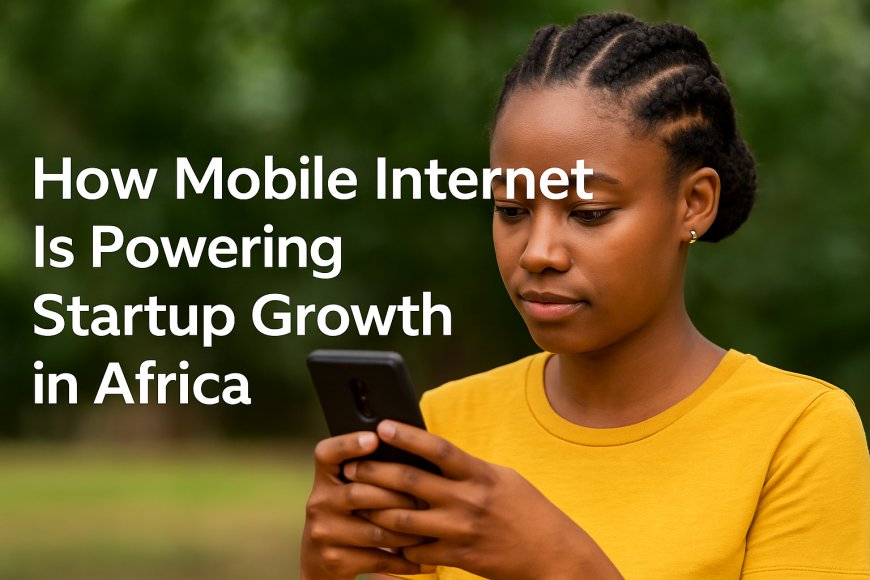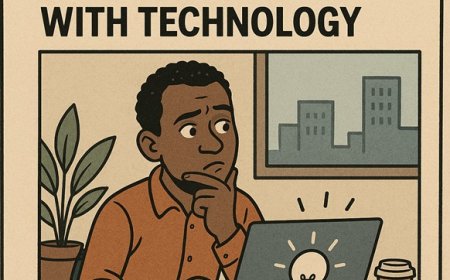How Mobile Internet Is Powering Startup Growth in Africa
Discover how mobile internet in Africa is accelerating startup growth by providing affordable access to digital tools, markets, and customers, transforming business models across urban and rural communities.

The rise of mobile internet in Africa is transforming how startups are launched and scaled across the continent. With smartphones becoming more affordable and data access expanding rapidly, young entrepreneurs are using mobile platforms to build innovative solutions that solve real-world problems. From fintech to health tech, mobile connectivity is removing traditional barriers and unlocking new markets. Whether it’s selling products online, offering financial services, or delivering education through apps, mobile internet is now the backbone of Africa’s digital economy. In this blog, we explore how the mobile internet is powering startup growth and shaping Africa’s future in business and innovation.
The Rise of Mobile Internet in Africa in 2025
Over the past decade, mobile internet in Africa has shifted from a luxury to a lifeline. Thanks to decreasing smartphone costs, telecom competition, and infrastructure development, internet penetration is now crossing 43%, and mobile devices are the primary access point for this connectivity. In countries like Nigeria, Kenya, South Africa, and Ghana, over 80% of users access the internet via mobile.
This mobile-first behavior has shaped how businesses operate and how startups are born. In regions with limited desktop access, mobile internet becomes not just a utility, but a business enabler.
How Mobile Internet Enables African Startups
The internet is giving entrepreneurs access to customers, tools, and information like never before. With affordable data and smartphones, African startups can innovate, scale, and compete in both local and global markets.
Lower Barriers to Entry
Before mobile, launching a business required high infrastructure costs, offices, landlines, on-site software, and more. Today, with mobile internet in Africa, a smartphone and internet access are enough to start and scale a digital business. Entrepreneurs can now:
-
Launch apps directly to market
-
Manage operations via cloud tools
-
Market on social media platforms
This accessibility means anyone, even from rural areas, can enter the startup economy.
Easier Market Access
Startups can reach customers through WhatsApp, Instagram, and SMS-based campaigns without expensive billboards or TV ads. Mobile internet in Africa has transformed how consumers are reached, enabling hyperlocal and personalized digital marketing.
Sectors Most Impacted by Mobile Internet:
-
Fintech:
Startups like Flutterwave, Chipper Cash, and Paystack have built payment systems that run almost entirely on mobile. With unbanked populations relying on mobile money, mobile internet is powering cross-border transactions, digital wallets, and P2P lending solutions.
-
Agri-tech
In agriculture-driven economies, startups are using mobile platforms to connect farmers with markets, offer weather updates, and enable mobile payments for seeds and fertilizers. Apps like Twiga Foods and Hello Tractor are changing lives in real time.
-
E-learning and Edtech
With mobile data, learning has gone beyond the classroom. Platforms like uLesson and Eneza Education reach millions via mobile video lessons, test prep, and remote tutoring.
-
E-commerce
Apps like Jumia and Sokowatch let customers shop, track deliveries, and make payments—all via mobile. Sellers, too, can run businesses from their smartphones, reducing the need for storefronts.
As connectivity improves, mobile internet in Africa will continue to be the driving force behind startup success. By breaking down barriers and enabling innovation, mobile technology is creating a future where African entrepreneurs can thrive, solve real problems, and grow sustainable businesses.
Challenges Still to Overcome even with Mobile Internet:
Despite the progress, the impact of mobile internet in Africa is limited by a few key challenges:
-
Data costs remain high in many regions
-
Coverage gaps still exist in rural and remote areas
-
Digital literacy is still developing
-
Cybersecurity and fraud risks are rising with mobile payments
Governments and private stakeholders are working together to fix these gaps, offering subsidies, education programs, and regulations to make the mobile ecosystem safer and more inclusive.
The Role of Policy and Telecom Support:
Governments across Africa have started to recognize how mobile internet fuels job creation and economic growth. Policies that encourage spectrum availability, infrastructure investments, and public-private partnerships are critical. Telecom providers, too, play a vital role by:
-
Offering low-cost data bundles
-
Partnering with startups for zero-rated access
-
Supporting mobile-payment platforms that increase financial inclusion
A New Generation of African Entrepreneurs
What stands out most is how the mobile internet in Africa has democratized entrepreneurship. From tech hubs in Lagos and Nairobi to remote villages in Uganda and Mali, mobile is giving rise to coders, creators, and change-makers.
Young people no longer have to move abroad to find opportunities. With connectivity in their pocket, they are building businesses that address local issues—water access, transport logistics, education, healthcare—and bringing real impact.
What’s Next for Startups Powered by Mobile Internet?
The future of startup growth in Africa will be even more mobile-driven. With 5G expanding, smartphones becoming cheaper, and AI tools optimized for mobile, we’re likely to see:
-
More mobile-first platforms solving daily life challenges
-
Cross-border collaboration between African startup hubs
-
Enhanced financial inclusion for unbanked populations
-
Stronger policy support for digital innovation
Final Thoughts
Mobile internet in Africa is no longer a trend. It is a transformative force shaping economies, startups, and futures. As infrastructure improves and connectivity deepens, we can expect even more groundbreaking solutions from African innovators.
If you're building a startup or investing in Africa, understanding the role of mobile is key. It’s not just a tool—it’s the backbone of the continent’s digital rise.
Frequently Asked Questions:
How is mobile internet helping African startups grow?
It provides affordable access to tools, customers, and markets, enabling startups to launch, scale, and reach remote regions.
Why is mobile internet important for entrepreneurs in Africa?
It reduces infrastructure costs and connects entrepreneurs to digital platforms for sales, marketing, and customer support across the continent.
What sectors benefit most from mobile internet in Africa?
Fintech, health tech, e-commerce, edtech, and agri-tech benefit through mobile platforms that increase reach and service efficiency.
How has the mobile internet changed business communication?
It allows instant communication via apps and messaging, helping startups collaborate, manage teams, and engage with customers in real time.
Are rural areas in Africa benefiting from mobile internet?
Yes, mobile internet is bringing digital inclusion, allowing rural startups to access financial services, markets, and digital tools.
How do startups use mobile internet for marketing?
Startups use social media, WhatsApp, and mobile ads to promote products and services cost-effectively and reach wider audiences.
What challenges do African startups face with mobile internet?
Issues include inconsistent connectivity, high data costs in some areas, and limited digital literacy among users and entrepreneurs.
Can mobile internet replace traditional business infrastructure?
For many startups, yes. It enables mobile banking, virtual offices, online marketplaces, and remote service delivery without physical infrastructure.
How does mobile internet support funding opportunities?
Startups pitch through online platforms, attract investors via social media, and join digital incubators powered by mobile connectivity.
What’s the future of mobile internet for African startups?
It’s expected to drive even more innovation, expand digital inclusion, and support cross-border growth and collaboration across Africa.
What's Your Reaction?
 Like
0
Like
0
 Dislike
0
Dislike
0
 Love
0
Love
0
 Funny
0
Funny
0
 Angry
0
Angry
0
 Sad
0
Sad
0
 Wow
1
Wow
1







